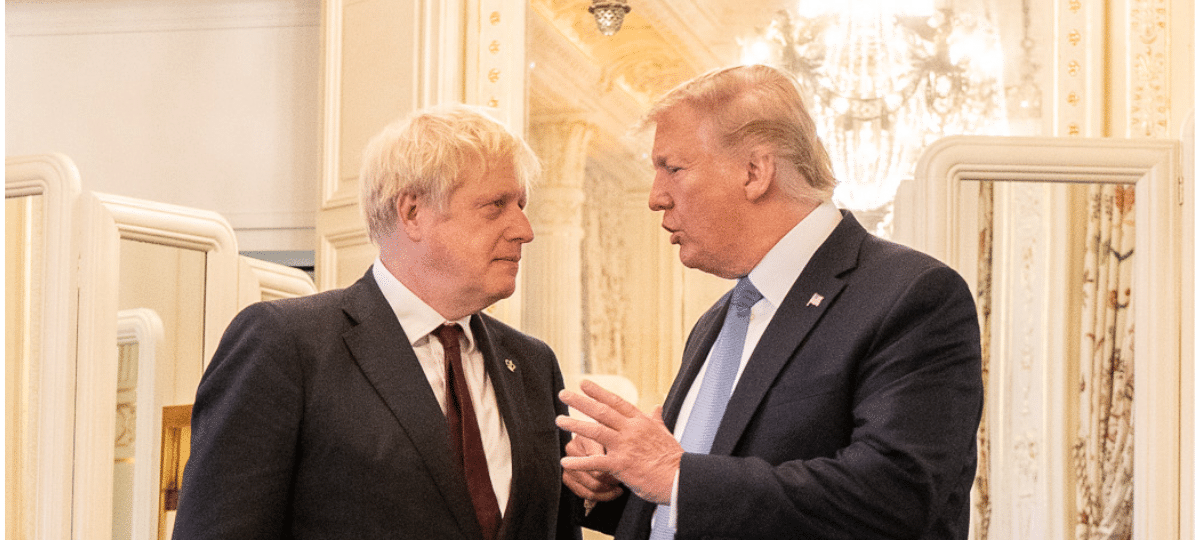by Veronique de Rugy
I have always thought that the comparison of United Kingdom Prime Minister Boris Johnson to US president Donald Trump was unfair to Johnson. And while admittedly I am no Boris Johnson expert, I do have his speech from February 3th to prove the injustice of the comparison. In fact, the more I read the speech, the more I think that, at least when it comes to trade, Johnson sounds more like one of the greatest defenders of free trade alive today, Donald Boudreaux.
I will let you be the judge.
Imagine the setting. The beautiful Painted Hall in the Old Royal Naval College in Greenwich. The place itself was the subject of the first part of the Prime Minister’s speech. In a very Johnsonian way, he noted:
“This painting above you was started in 1707, the very year when the union with Scotland was agreed – and does it not speak of supreme national self-confidence? Look at these well-fed nymphs and cupids and what have you. They are not just celebrating the Triumph of Liberty and Peace over Tyranny – the official title of the scene.”
And with that he doesn’t waste many words to tell us what this speech would be about: his terms in the next stage of Britain’s negotiations with the European Union. But the way Johnson goes about it is brilliant, as he takes time to set his position in the intellectual tradition of Adam Smith and David Ricardo. He said:
“We in the global community are in danger of forgetting the key insight of those great Scottish thinkers, the invisible hand of Adam Smith, and of course David Ricardo’s more subtle but indispensable principle of comparative advantage, which teaches that if countries learn to specialise and exchange then overall wealth will increase and productivity will increase, leading Cobden to conclude that free trade is God’s diplomacy – the only certain way of uniting people in the bonds of peace since the more freely goods cross borders the less likely it is that troops will ever cross borders. … And since these notions were born here in this country, it has been free trade that has done more than any other single economic idea to raise billions out of poverty and incredibly fast.”
This discourse offers a stark contrast with what we hear about free trade in America these days.
Unfortunately, he tells us, politicians around the world – politicians whom he is not afraid to denounce – are trampling the benefits of trade.
“The mercantilists are everywhere, the protectionists are gaining ground. …From Brussels to China to Washington tariffs are being waved around like cudgels even in debates on foreign policy where frankly they have no place – and there is an ever-growing proliferation of non-tariff barriers and the resulting tensions are letting the air out of the tyres of the world economy.”
He goes on to promise that the British people can count on him to be the champion of “the right of the populations of the earth to buy and sell freely among each other” starting with Africa, and then “Japan and the other Trans-Pacific agreement countries, with old friends and partners – Australia, New Zealand, Canada – on whom we deliberately turned our backs in the early 1970s.”
Johnson wants to make a free-trade deal with America too. On that point he says, “We will get going with our friends in America.” My colleague Dan Griswold is ready with a blueprint of what a UK-US free-trade deal should look like.
Once again, Johnson denounces the US for its protectionism when he notes “it is high time I think we all agree that they cut their punitive tariffs on Scotch whisky.” To be sure, it is!
But the Prime Minister’s main purpose was to lay out his opening position in talks about Britain’s future relationship with the EU. And that part of the speech, too, is enjoyable. Johnson announces among other things that the era of bureaucrats in Brussels setting the tone for what the UK does is over, not because Johnson wants to engage in “dumping,” destroy the environment, or undermine EU standards, but, rather, because other European countries are bad role models to follow, and not just because many of them are economic basket cases. Case in point:
“France spends twice as much on state aid as the UK, and Germany three times as much, who is using subsidies to undercut? Not the UK. In fact, the EU has enforced state-aid rules against the UK only four times in the last 21 years, compared with 29 enforcement actions against France, 45 against Italy – and 67 against Germany.”
“The same applies to social policies,” Johnson notes.
Here I part company with him over his bragging about how much better the UK government is than the EU bureaucracy. Not least of the reasons for my belief that he has no good reason to brag is that he goes on to talk about how much more paid leave the UK government mandates, how much higher than other EU countries is Britain’s minimum wage, how strict are the UK’s ivory bans compared to the EU’s bans, and how the country’s ban on single-use plastics goes further and faster than anything proposed by the EU.” Unfortunately, these well-meaning policies will inevitably backfire and hurt the people – and elephants – they are supposedly meant to help.
As problematic as this last section is, it nevertheless gives Johnson an opportunity to demonstrate his profound understanding of the benefits of free trade. He notes that these differences are no reason to demand that the EU match the UK on all these dimensions before accepting “a zero-tariff zero-quota deal with the EU.” As he notes:
“So I hope our friends will understand that what is sauce for the goose is sauce for the gander. … There is no need for a free trade agreement to involve accepting EU rules on competition policy, subsidies, social protection, the environment, or anything similar any more than the EU should be obliged to accept UK rules.”
It looks like the Prime Minister understands the concept of sovereignty, the economic benefits of free trade, and even the value of competition between nations using different rules. These are concepts that, unfortunately, elude our president here in the US.






5 comments
… [Trackback]
[…] Find More Information here to that Topic: thelibertarianrepublic.com/the-huge-difference-between-boris-johnson-and-donald-trump/ […]
… [Trackback]
[…] Here you can find 45730 additional Info to that Topic: thelibertarianrepublic.com/the-huge-difference-between-boris-johnson-and-donald-trump/ […]
… [Trackback]
[…] Here you will find 55170 additional Information to that Topic: thelibertarianrepublic.com/the-huge-difference-between-boris-johnson-and-donald-trump/ […]
… [Trackback]
[…] Read More to that Topic: thelibertarianrepublic.com/the-huge-difference-between-boris-johnson-and-donald-trump/ […]
… [Trackback]
[…] Read More to that Topic: thelibertarianrepublic.com/the-huge-difference-between-boris-johnson-and-donald-trump/ […]